
The average student is juggling a lot more than just their studies: family, work, hobbies/interests, health issues, COVID restrictions etc. Good time management is essential in meeting all of one’s responsibilities. In this post, I cover time management from the perspective of things I think are GOOD to do, and things that maybe SHOULDN’T be done. I update this post regularly as I learn more about time management myself. Reading time ~ 15 minutes.
Put simply, time management, in the context of study, is about deciding ‘what to study, how long to study and how to study‘.
I’d love to tell you that there is a simple and easily implemented ‘hack’ that can make you better at managing time. But there isn’t.
For the most part, it is a process of training your mind and developing and linking together habits and routines. It takes deliberate practice and experimentation.
Just about everyone I know (myself included), no matter what stage of life or level of success, reports wanting to manage their time better. In fact, the older I get, and the less time I have on this planet, the more interested I am in using it better.
It is one of those skills like ‘managing relationships’ where you are always learning and experimenting. I’m pretty sure I will meet my maker, still very much in the process of trying to fit them in to my schedule [‘Could you take me to the afterlife around 2.00pm? I’ve got a few things I need to get done first’].
In this context, it important therefore that you wrap your head around some basic time management principles, so you can start experimenting effectively. That is the purpose of this post/article. To pull together some of the better time management principles and tips that I’ve discovered along the way.
Do you need to get all of the tips below correct in order to manage your time better? Not at all.
Don’t view time management as something you get 100% right. Think of it as something you purposefully improve over time, in the same way that you might learn and become increasingly proficient in a new language.
A couple of notes before you get started:
Research suggests that time management does work. “time management is moderately related to job performance, academic achievement, and wellbeing. Time management also shows a moderate, negative relationship with distress.” An intervention that makes me more productive and happier? Sign me up!!!! The take home point here is that time management isn’t just something we recommend because it sounds nice. We recommend it because it has measurable benefits.
I’ve divided the tips (which I’ve gathered along the way from research, articles, counsellors and my own experiences) into ‘Shit you should probably do’ and ‘Shit you probably shouldn’t do’. Apologies for the potty mouth, but I’m feeling a little dangerous today, like the Fonz.
Principles of Time Management (V1.3)
Managing your time better consists of adopting good habits and breaking bad ones. Here is a quick overview of what you should do and what you shouldn’t do.
Shit you should probably do….
Value your time
Your time and attention are potentially the two most important assets you have. Treat them with respect. Allocate your time and attention to things that are important to you and those you love. Remind yourself regularly that how you allocate your time is a central factor in your overall happiness, so do your best, with the constraints of everyday life, to allocate your time wisely.
Do a time audit
Pick a typical week and write down everything you do. Rate each activity in terms of how pleasurable and/or meaningful it is. Work out how much time is being allocated to tasks that are neither pleasurable or meaningful. See if you can allocate that time differently.
Have at least some idea of what you are working towards.
Set some goals: daily ones, weekly ones, monthly ones. Hell, why not go and do some 5-year and 10-year goals while you are at it. Goals focus your attention on what you need and want to get done. Another word for goals when dealing in timeframes of a day or a week is ‘tasks’. I set myself at least 3 tasks per day, a mix of things I need to get done and things I want to get done. Make sure your daily tasks are coherently linked to your medium and longer-term goals. For example:
Spend 1 hour per day doing readings for each topic and taking notes (daily task) –> knowing the material for assignments and exams –> doing well on assignments and exams (medium-term goal) –> getting my degree –> getting a great job (long-term goal).
Have at least some idea of the relative importance and urgency of those tasks and goals.
Some tasks have due dates. Make sure you know when those are so you can determine how urgently you need to get them done. In fact, I suggest that at the beginning of each semester, you write in your diary/calendar the due dates for all assignments and exams.
If something doesn’t have a due date, set yourself one (e.g. ‘I’d like to get this done by the end of the week’) and schedule your time to try and meet that due date.
Try hard to meet due dates. Once you get into the habit of putting things off and asking for extensions, those are hard habits to break. In the workforce beyond university, if you can commit to and achieve work by set dates you will be a very valuable asset.
Put some kind of coherent plan together for how to achieve your tasks and goals
I don’t really care what system, or collection of systems (e.g. calendar, diary, to-do list, reminders, planners etc) you use, but find something that works for you in accurately capturing what you need to do and by when. I pretty much do all my planning in Outlook and a program called Workflowy these days because between the two they cover dates, times, tasks, events, reminders, note take and organising my thoughts. Warning: if your system is too complex, you’ll spend all your time maintaining the system and not getting any work done. In fact, setting up overly complex time management plans is one way that I see students procrastinate.
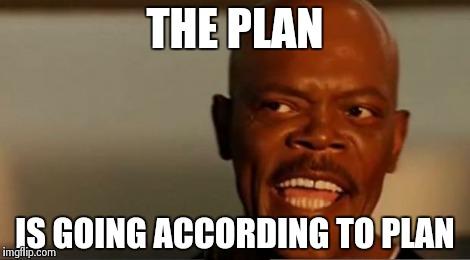
Organise your desk and work space – don’t be a slob
Relatively straightforward recommendation. You might have convinced your mum that you ‘work best in chaos’ but you haven’t convinced me yet. Your workspace doesn’t need to be pristine (mine certainly isn’t) but it should be relatively organised. Organised means having to hand what you need to get your work done: books, computer, internet, writing materials, water, snacks etc. It also means a space where potential distractions are minimised or contained. I’ve talked previously about how to create an enticing study space in this blog post.
Have a ‘no interruptions plan’ in place
A ‘no-interruptions plan’ is simply a set of preparations you’ve made for how to handle common interruptions. You execute these preparations at the point at which someone or something tries to deviate you from your study.
- people disturbing you – ‘f*&k off, I am working’ is harsh but effective – a nicer version might be simply closing your door or using a do not disturb sign.
- the desire to open up every social media account you have when you sit down to study – social media won’t help you get quality work done. It can be a great place to showcase the work you’ve got done, but it isn’t a productivity tool. Close it when you need to get stuff done.
- chocolate – I still constantly get interrupted by chocolate – just did right then….
- the entire internet – consider getting and using some device or internet blocking apps such as https://getcoldturkey.com/ if you are one of those people that can’t go 10 minutes without checking something on the internet
Be generous in allocating time to the things you need to get done
Humans (even the smart ones) totally suck at estimating how much time they need to get something done. Think of how useless Elon Musk has been at predicting when full autonomous driving capability will be ready, and he is one smart dude!
In our ‘Getting Off To A Good Start‘ guide, we included an infographic outlining how much time you realistically need to commit to study if you are full-time student. It takes a lot of students by surprise.
Generally the rule is to allocate more time to a task than you think you will need. From the perspective of assignments, this usually means getting started on them earlier than you initially predict.
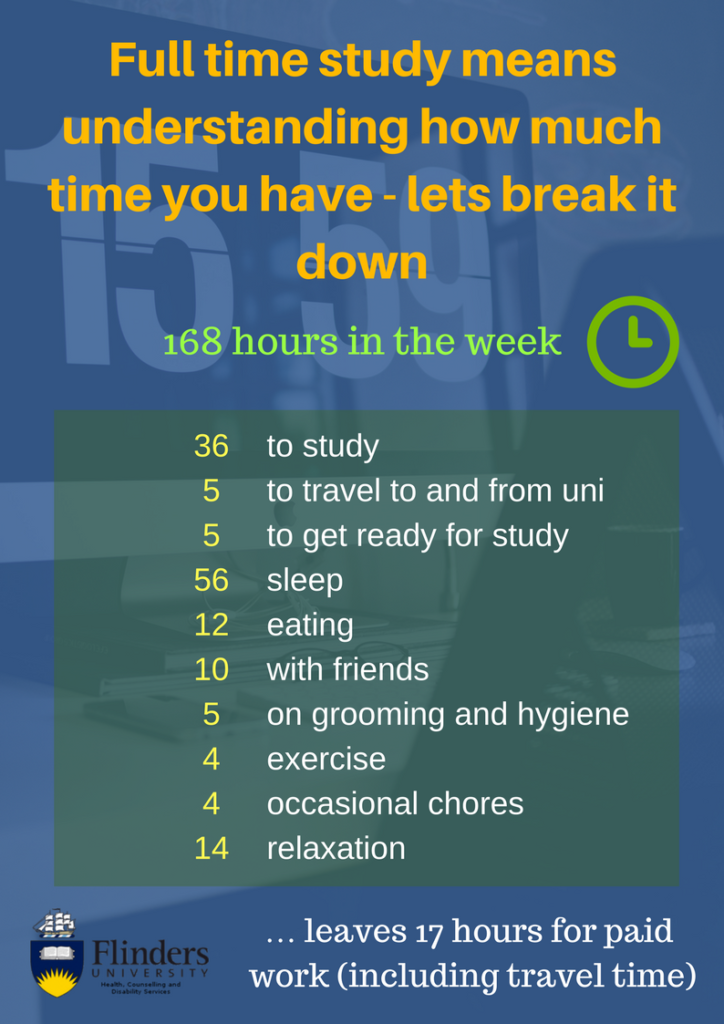
Think about your future self
We’re always doing things to make things harder for our future self: eating crappy food, drinking too much booze, not exercising, saying yes to dumb projects.
We similarly diddle our future selves with the decisions we make about how to use our time. ‘I can do that tomorrow’ is the classic cry of the procrastinator that condemns their future self to deal with the fallout of another lazy day.
I’m not suggesting that you should think only of your future self (this can disrupt being ‘in the moment’) but when it comes to allocating and using our time, it is worth thinking of that poor soul (your future soul) that you are tormenting with your decision to not work on something today.
Work out if you are a morning or afternoon or evening person
I’m a mid-morning person. I get my best work done from about 8am till 2pm. After that I am useless and should be whipped accordingly.
There are limitations on the extent to which someone can structure their day according to their energy levels, as not too many jobs allow you to work only from midnight till 7 in the morning. However, you can look at structuring your day so that you use your most productive periods for churning through your most important work. This is an important concept – match the complexity of the work to the time of the day that you believe your thinking is at its best.
I say this because there are legitimate differences between people in terms of their chronobiology, namely, working time preferences and abilities.
Abandon dead-end projects
I say ‘yes’ to lots of things because at the time they sound amazing. That includes saying ‘yes’ to many of my own stupid ideas.
This can leave you with more projects than is feasible to complete. That leads to stress. Stress leads to poor performance etc etc.
Students sometimes get caught in this trap in relation to extra-curricular activities. Driven by noble desires, they take on lots of extra activities in addition to their studies, then find themselves overloaded, but reluctant to drop anything.
At some point you need to critically assess your involvement in your various projects and determine whether any can be abandoned or delayed. Remember that delaying is a realistic option. That ‘great business’ idea you have doesn’t necessarily need to be scrapped, but perhaps it needs to be put on the back burner until you’ve finished your assignments.
I find myself saying ‘do less, but do it better’ more often than I find myself saying the opposite.
Put important notes straight into your diary/calendar/to-do list
Write stuff down, like due dates for things, in the place where you are organising your life. Don’t rely on memory.
Use your valuable short-term and working memory space to remember interesting content from your topics and the faces of attractive people.
Use calendars and diaries to hold onto the more mundane but still important items like due dates and task lists.

Stay healthy
You are a biological organism. Biological organisms work best under certain circumstances: appropriate sleep, good nutrition, regular movement and activity etc.
If you are healthier, you’ll be a more efficient and productive worker. It isn’t rocket science.
I’m not going to lecture you on what constitutes a ‘healthy lifestyle’. Most Gen Y and Z people probably know more about health and wellness than I do. However, ‘knowing’ about it is a very different thing to living it.
You can get measurable gains in academic performance from simply attending to nutrition, sleep and exercise. Plus you reduce the probability that you’ll end up a decrepit old man like me.
Break up study time
Unless you are one of those people who can enter a perfect state of flow and work solidly for 8 hours in a stretch (mammoth gaming sessions don’t count), then take a brief walk or stretch every 40 minutes. In the ‘good ol’ days’ it used to be a cigarette break (I don’t recommend them) but they were good for punctuating the day with moments of recalibration.
I find it often only takes a 5 minute stretch in the garden for me to reset and be able to get back to my work. Nature is a wonderful way of restoring attention and concentration.
Some people find pomodoro timers useful for scheduling breaks into their workflow.
Come up with a cool routine that precedes you sitting down to work
Since working from home a lot more because of that whole Coronavirus thingy, I start my days with at least 2 of the following: quiet contemplation, yoga, walk, drawing.
It means I start my working day with a nice combination of being relaxed, alert and feeling superior to everyone else. What better starting point for getting down to some serious work?
It is the same philosophy as having a night-time routine (e.g. pyjamas, brush teeth, switch off lights). The idea is to communicate effectively to your brain that a transition is happening. In this case you are transitioning to study.
Some people like to use the word ‘ritual’ instead of routine. I like this word also. It implies something you do regularly, but which you find meaningful and beneficial.
Get in the habit of wrapping study activities around lectures and tutorials
Lectures and tutorials provide important anchor points around which you can focus your study. For example, see if you can get in the habit of doing the necessary reading BEFORE each lecture and then take time to review your notes AFTER the lecture. Essentially try to ‘wrap’ the lecture in preparation and revision activities.
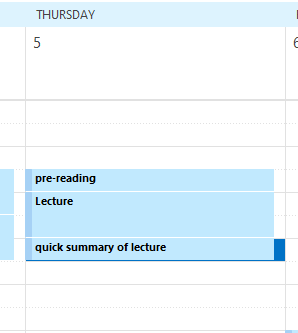
Leave time for boredom
I am not good at ‘doing nothing’, however I routinely find that periods of boredom lead to creative insights or unexpected surprises.
We tend to assume that time spent ‘bored’ is wasted time, but if we simply pay attention to the moment (e.g. notice the sights, sounds, textures, smells and tastes around us, and tune into how we are thinking and feeling), the moment typically returns to us something a bit different and new that can set us on a new and interesting path. Or maybe it will help us solve a difficult problem or make progress on a challenging decision.
So, see if you can be OK with sometimes being bored.
Shit you probably shouldn’t do
In some cases, these are just the opposite of the suggestions above. However it is worth pointing them out because these are the kinds of mental and study traps that we all fall into at some point.
Overschedule
It is tempting, when trying to maximise one’s work output to allocate every second of the day to a work task. I’ve tried this myself. It rarely works.
It can work for short periods of time. For example, in the couple of weeks leading up to exams it might be wise to allocate most of the working day to study. But this can only typically be sustained in short bursts.
You want there to be time in your calendar that can allocated to the things that we know bring meaning and purpose into our lives. Time with others. Time helping others. Time learning something new. Time for boredom (as I described above).
Wear ‘busyness’ as a badge of honour
Have you noticed how often we say to each other “I’m heaps busy” like it is an achievement? I certainly do. One of the things I learned in the first COVID-19 lockdown was that simplifying my life and reducing ‘busyness’ actually led to an improvement in my overall wellbeing. There is a big difference between doing important and meaningful work and being ‘busy’.
Procrastinate
You know how you reckon that you can ‘do it later’. You can’t. Let’s face it, you’ve met your future self. They are as disinterested in the task as you are.
If procrastination is a problem for you, be specific and deliberate about addressing it, as soon as you can. We also have a program called Studyology that helps you understand the psychological reasons for procrastination. It is available on Oasis Online.
Perfectionize
Yep, I just made up a word but I am sticking to it. To ‘perfectionize’ something means to only accept perfect performance and nothing else.
Any student who has struggled with perfectionism knows how debilitating it can be, both emotionally and productively.
Accept that some of your work will be ordinary.
It is better to get in the habit of producing work reliably, than aiming for perfection and perhaps getting frozen and not producing anything at all.
Just like procrastination, if you struggle with perfectionism, be deliberate about addressing it, as soon as you can.

Leave unused time unallocated
Those gaps in your calendar/planner after you’ve put in all the things you ‘need’ to do, should be allocated to either ‘healthy stuff’ or ‘fun stuff’ or ‘social stuff’ (sometimes a single activity is all three). If you don’t allocate time for health, fun and social, then you will find yourself filling that time with work and study.
Now, don’t let me stop you doing that if that is really what you want to do, but most people I talk to want to have some work/life balance and this can only happen if you are deliberate about allocating time to the ‘life’ part.
Treat the other aspects of your lives as tasks that should be allocated time. They are equally (if not more so) as important as your study, so why wouldn’t you schedule them?
Just focus on urgent tasks
Then your life becomes one giant last-minute panic. Make sure a day has a good mix of ‘urgent’ and ‘important’ tasks. An important task is just one that will become an urgent task if you don’t start it early enough.
Pretend like you are awesome at estimating time – you aren’t.
We all confidently go around saying ‘that will take me 50 minutes’ ‘I can do that in a day’ ‘that study should take us 6 months’. We’re always wrong. Sometimes laughably so. Because you can’t really estimate time well, you need to give yourself buffer periods. This means starting stuff as early as you can.
It often isn’t until you dig into a task, that you start to develop a better sense of how long it will take to finish. It might not be until halfway through a task that a person has a more accurate sense of how long it might take to finish.
Always pander to your current self
Your current self is impulsive and selfish. They will want to abandon anything important and run gleefully towards the bright, shiny, colourful or tasty objects. When it comes to work, pander to your future self instead (the one you want to be successful and good looking).
Multi-task
Hate to break it to you but you aren’t an AMD Ryzen Threadripper CPU with 64 cores and 128 processing threads. Just do one thing at a time. You might like Oliver Burkeman’s exploration of the topic in his NYT article.
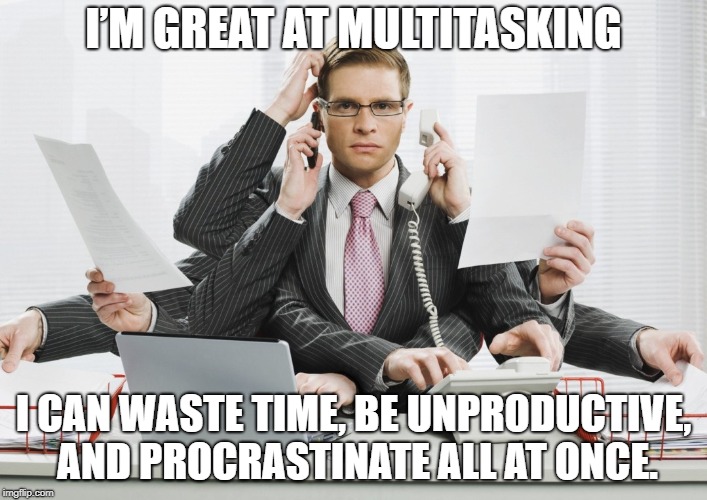
Create clutter
Yes yes, you will say that clutter is a sign of genius but mostly it is slobbish and having a negative impact on your mood and level of engagement. Try to start each day with an organised, uncluttered workspace.
I actually recently started a Saturday morning ritual in which I tidy and clean my study area, so it is pristine for the upcoming week.
Hang out with time wasters
If you know people that are worse procrastinators than you, give them the boot, or at least only interact with them during free time you have. Procrastinators will gladly try to bring you over to the dark side.
Sit in the one spot for hours on end
Get a change of scenery. Mix it up. Use those legs. Do a push-up.
Use social media
Ok, this one is is probably unreasonable as social media is part of the glue holding society together at the moment.
However it quickly becomes the time-waster that slowly erodes your soul (note: I think I might have some attitude issues when it comes to social media).
Let’s compromise and say ‘don’t use social media all the time’. Spend more time creating cool stuff that you can then show on social media. Then you can use social media for what it was designed for – making your friends and family feel bad because they aren’t as productive as you.
There is a difference between what you do and how you do it
There are a million apps and programs and courses out there that make the claim that they can improve your time management. To-do list apps as an example.
Some of them might turn out to be useful to you.
But it isn’t the app or the program that makes the difference (people were productive long before those apps existed), it is what you achieve with the app/ program that is important. The to-do list app isn’t what makes you efficient. It is the fact that you committed to the process of creating and following to-do lists that made you better at your work. You changed your behaviour.
Focus on the new behaviours/habits you are trying to build, not trying to find the perfect app/program to help you do it.
If you are fascinated by behaviour change and habit formation (as I am), wrap your brain blob around BJ Fogg’s work on Tiny Habits.
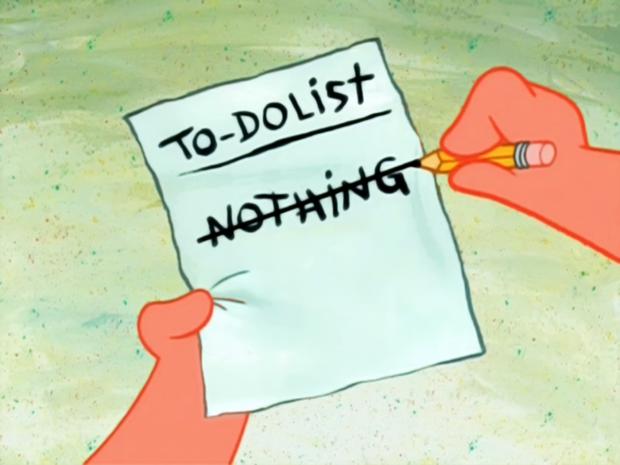
Time management involves practice and experimentation
Time management is a skill.
Skills require practice and experimentation.
Identify an improvement you’d like to make and spend a month trying to get it right. Start with trying to develop a good system for recording what tasks you need to get done and when.
The good things about realising that time management is a set of skills is that:
- you can get better at it
- other people have already got better at it and you can use their ideas
- how good you are at it will depend on how much you practice
- people will encourage you in your efforts to get better at it
What can you expect if you get this all correct?
According to this review from 2005 (a bit old now), improving your time management skills is associated with:
- a greater sense of control (over your time)
- improved mood
- improved satisfaction with study
- reduced stress
- MAYBE improved grades
There is also the meta-analysis I mentioned in the intro that showed “time management is moderately related to job performance, academic achievement, and wellbeing. Time management also shows a moderate, negative relationship with distress.”
It is probably fair to say that time management has positive impacts.
Where to read more/references
Type ‘time management’ into Google and you’ll get more than enough articles and tips on the topic.
I did like this recent brief interview with Oliver Burkeman in which he cautions against time management hacks and instead invites us to look within to really confront the truths about the time we have and what we should prioritise in that time.
Ashley Whillans is an Assistant Professor of Business Administration at Harvard Business School and studies how to address time stress.
I’ve also drawn on this review quite a bit – https://journals.plos.org/plosone/article?id=10.1371/journal.pone.0245066
Keep in mind that reading more about time management eventually leads to diminishing returns.
The key is to start experimenting with different strategies and new behaviours to see if you can improve your time management skills directly.
I’ll also revisit this Time Management Guide again in the future, when I’ve learned new ways to wrangle time.

